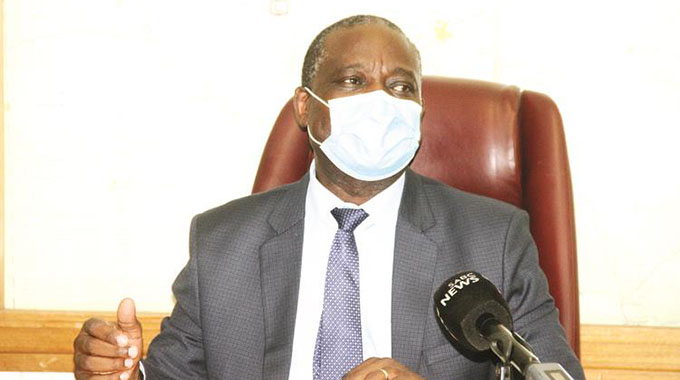EDITORIAL COMMENT: Relaxed lockdown a boon, but vaccination still needed

The return to a level two lockdown with normal business hours has been enthusiastically welcomed by all business sectors, who while they managed to cope, just, with the restrictions of the level four lockdown obviously need their workforce to be putting in a full eight-hour day if they are to meet their production schedules and expand output.
The Government did its best when the third wave struck Zimbabwe in June, by adjusting the level four lockdown to allow the bulk of businesses to remain open, although for limited hours, and even managed to keep a very large swathe of the informal economy functioning by giving market traders maximum priority for vaccination.
We survived the third wave without any economic meltdown or much suffering, and there was perhaps a bonus with many operations managers learning how to boost productivity and cutting wasted work hours so that they could keep up with their production schedules despite the reduced working hours. That will come in useful as they start to push expansion.
The retail sectors — large, medium, small and informal — obviously win with factory and office workers now able to shop on their way home instead of just buying basics in a hastily grabbed few minutes over the lunch hour.
Two factors stressed by President Mnangagwa when he was able to relax the lockdown was that public health precautions are still rigid under the lower level, and will be enforced, and that vaccination was the only way we can even start to think about a normal or near normal life.
The rules on masking, temperature checks, social distancing and sanitising remain in place. All that really changed was the longer business hours, the shorter curfew and the permission for lower-level social gatherings. The rest of the lockdown restrictions and rules are still there, and the President made it clear that those who thought they could relax these will find that the police and other authorities will still be enforcing them.
The shift to the level two lockdown was done at the earliest possible moment. The third wave has been receding, fairly slowly, since infection rates peaked in the middle of July, but infection rates are still about four times what we were seeing between the second and third waves although only around six percent of what we saw at the peak.
We all need to be very careful if infection rates are to continue falling and we are to avoid a sudden surge. Among other things we need to remember that our vaccination rates are higher than our neighbours and that the World Health Organisation is very concerned that Africa is now becoming the continent hardest hit by Covid-19. So businesses need to be very careful about how they protect people like their long-distance truck drivers. Fortunately the business sectors are responding realistically to the President’s relaxation of the lockdown. The Confederation of Zimbabwe Industries is urging everyone to keep up the tight enforcement in workplaces of the public health measures to minimise risks and to keep encouraging workforces to go for vaccination and make arrangements for them to get their jabs.
CZI also brought up the interesting statistic that most industrialists have been pushing vaccination and most factories have more than 80 percent of their staff having had at least their first jab.
Some businesses are now going further and setting internal standards that all staff must produce either a vaccination card or a recent negative test result. This appears reasonable, considering that vaccination cannot legally be made compulsory, but has raised some objections, including those from the Zimbabwe Congress of Trade Unions of all people.
For decades trade unions and workers committees have, quite rightly, been a major pressure group for better health and safety standards at work and for those standards to be followed. Any factory manager trying to skimp on protective clothing, for example, quickly finds a union representative or workers committee chairman seeking an urgent interview.
With vaccination rates continuing to slow, a worrying development probably generated by the fall in infection rates making too many willing to postpone their jabs, we would have thought that the time has now come for unions and workers committees to be pushing for a safer work environment by getting more people vaccinated and, at the same time, making sure management provides required assistance such as transport and the time off to stand in a queue. After all with a majority of formal sector staff now vaccinated, these people deserve protection from those who are not.
A lot of the reluctance by some to accept vaccination seems to be generated by a lack of information and an over-willingness to look at weird social media platforms, frequently generated by those who follow conspiracy theories or the curious results of conservative American politics. The more people of some standing who push for vaccination the quicker we will all work in a healthier environment.
To show what is possible, last week at the opening of the new Chinhoyi Courts complex, Chief Justice Luke Malaba mentioned that of the 1 900 staff in the court system, 1 822, or 96 percent, had been vaccinated. Obviously neither the Chief Justice nor the Judicial Service Commission is going to infringe anyone’s legal or constitutional rights, so the incredible percentage has another source.
The most obvious is that a high percentage of those in the courts system are lawyers who spend their working days evaluating evidence, looking at the source of that evidence and weighing it precisely. When these specialist practitioners in evidence evaluation find out that vaccines are totally safe, work well and drastically reduce risk, with this evidence coming from the near unanimous opinion of medical experts, and that the contrary evidence comes from a bunch of medical amateurs, they draw the right conclusion and roll up their sleeves for the nurse.
As the President noted, Zimbabwe is far from being out of the Covid-19 woods, especially with new variants looming on the horizon. The Government, with the President in the lead, has gone further than almost all African countries in procuring vaccines and setting up an efficient and practical system so that everyone can get their jabs. The vaccines are there, the nurses are there. We just need to collect.









Comments